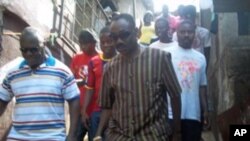One of the candidates in Liberia’s upcoming October presidential election says, if elected, he would institute a new economic policy that would empower Liberians to have a say in the management of their natural resources.
Dew Tuan-Wleh Mason, Liberia’s former ambassador to France under former President Samuel Doe, is running as the candidate of the New Deal Movement Party.
Mason says Liberians should replace President Ellen Johnson Sirleaf because her government has failed to deliver on the promises of good health care, good roads, and education.
“I’m not running because I’m looking for a job. I’m running for president because I believe we can do better. We need to start to solve some of the fundamental problems to which our country is saddled. We are running because we need to institute a new economic policy which will empower Liberians. Yes, we are running because we are not pleased with the lack of adequate health, the lack of good education, the lack of roads,” he says.
Mason cites as an example the lack of public participation in recent concession agreements affecting the country’s mines, forestry and petroleum products.
Liberia’s Planning and Economic Affairs Minister, Amara Konneh, told VOA recently the government’s framework for improving the lives of its citizens can be found in the Poverty Reduction Strategy covering the period 2008-2011.
He says it aims at rehabilitating the West African country’s broken infrastructure, including roads and hospitals.
Mason, who supported Mrs. Sirleaf in the 2005 election, says he’s running against her this time around because she did not deliver on her promises.
“As my people asked me in Grand Gedeh (County), the question was asked as to why [I am] not supporting the president again. I said, ‘Well, we native people go around during Christmas time and dress the devil and we bring the devil to entertain us, and the drums begin to beat and the women begin to sing and we realize that the devil can’t dance. So, those of us who want to bring that devil to town, it becomes our responsibility to go and undress that devil and bring a new devil to town,’” Mason says.
He says Liberians should elect him in October as the new country devil and if it turns out he cannot dance, they should remove him also.
Mason says, if elected, he would do a better job in fighting corruption, which he describes as the albatross that has been hanging around the neck of Liberia.
“I think the first step is to show leadership by example. Leadership in the fight against corruption must begin with the president. As you know, our people say the fish begins to rot from the head. We need to ensure that the president sets the example,” he says.
The government admits corruption has become intertwined in the fabric of society, but Anti-Corruption Commission Chairperson Frances Johnson-Morris told VOA recently the Sirleaf government has the political will to fight corruption.
Mason says his party is among a number of opposition political parties that have organized themselves to defeat the coming August 23rd referendum because it is intended to re-elect President Sirleaf.
“There is an attempt to change the residency requirement for election of a president from 10 to 5 years, which…tailored to…the peculiar circumstances of the president,” he says.
Liberia’s Elections commission chairman James Fromayan told VOA recently that Mr. Mason and a number of other potential candidates could also stand to benefit if the residency amendment.
Mason was a member of the progressive Movement for Justice in Africa (MOJA), which played a pivotal role in the struggle for social justice and democracy in Liberia in the 1980s.
But now, he’s considered by some as a wealthy man. He says he gained his wealth not from working for the government, but as a businessman.
“As you know, I’m one of the few government officials who resigned his post because of differences with [the] government because of the excesses of the [Doe] regime and I went into private business, particularly in the oil business from which I was able to acquire the capital that you might consider as being rich,” he says.
Mason says he was instrumental in bringing together nine opposition parties to form the National Democratic Coalition.
“Come October 11, 2011 we shall win. The question is very clear in our minds. To achieve victory, we need unity and the unity of the forces is what we have been able to put together,” he says.




